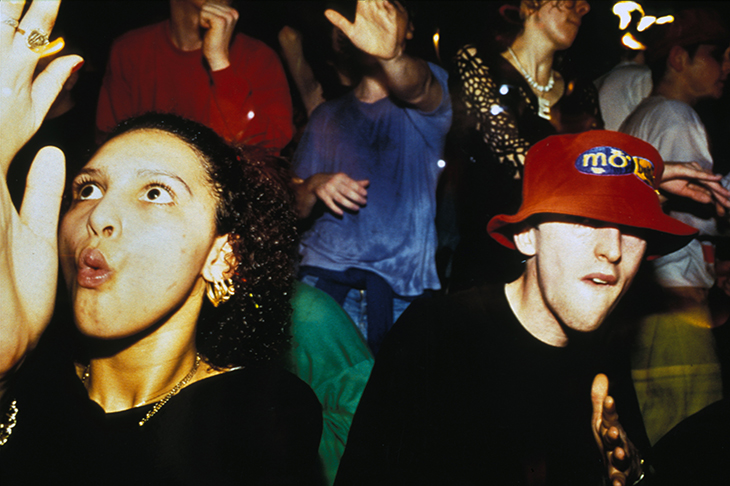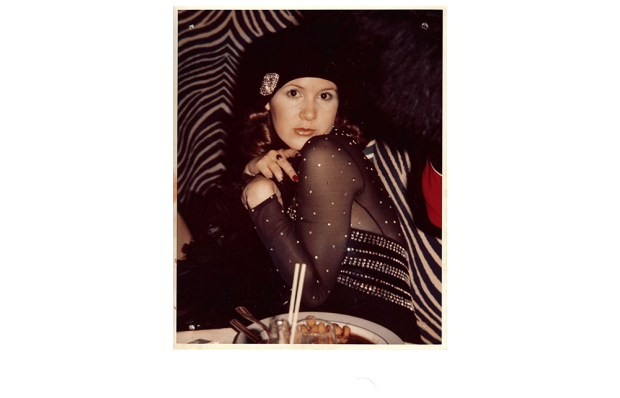Jeremy Deller’s Everybody in the Place: an Incomplete History of Britain 1984-1992 (BBC4) began with some footage of kids queuing up outside a warehouse rave in Stoke-on-Trent in 1991. It was at once banal and extraordinary: everyone was white; nobody was overweight; none of the clothes were designer, expensive or branded; nobody wore facial hair. This was the England of my late youth and I remember it vividly. But it feels so remote from the present that it might just as well have been a lithograph of extravagantly side-burned men in stiff woollens captioned: ‘The Camp before Balaklava’.
Deller is probably a bit more left-wing than me — how could he not be? He’s a conceptual artist whose most famous work is a meditation on the miners’ strike — I do agree with his thesis that the birth of acid house was the revolutionary moment that changed Britain forever. He illustrated this with scenes of Northern ravers clubbing in disused factories, marking what he called the ‘death ritual transformation of Britain from an industrial to a service economy’.
In 1988, I experienced some of this myself at an acid house night called Love at the Wag. The music was better in those days and so, of course, were the pills. I remember queuing up outside in my smiley T-shirt, my red bandana and my Boy cycle shorts with the Madonna on them (London, obviously was the exception to the rule I mentioned above about designer gear), conscious of being gawped at by all the straights, and thinking to myself: ‘Wouldn’t it just be amazing if this niche thing I’m part of ever caught on.’
Apart from the repetitive beats, what I thought the world could particularly benefit from was that overwhelming love and friendliness and joy you experienced once you got inside. Sure it was drug-induced — by the powerful MDMA you bought for about £30, a lot of money in those days from the man with the bum bag — but none the worse for that. Sometimes you’d dance manically, like the Viz clubber Ravey Davey Gravy, to Balearic anthems like ‘De Testimony’ by Fini Tribe with its distinctive church bell samples. Or, if you were too monged, you’d repair to the chill-out area upstairs where recently converted football hooligans would stroke your hair and tell you how much they loved you, mate. Well, in the days before mobile phones you had to make your own entertainment.
Further to emphasise the strangeness of this period, Deller couched his documentary in the form of an illustrated lecture, given to a very bemused class of what looked like GCSE students at an inner London comprehensive. Almost none of them was white; most of the girls wore hijabs. When Deller asked if any of them had been to the country none of them raised their hands. Nor did they consider themselves ‘British’. One girl said that she felt more of a Londoner than anything. Anywhere else — she’d been to Oxford once — she claimed people stared at her and made her feel out of place.
I liked Deller; and I liked his slyly subversive message even more. Sure it made dutiful nods to the fashionable leftie politics of the era — the travellers who descended on Stonehenge, the anti-road development Swampy types, the Greenham Common protestors — but deep down, I think, it was a plea for that tolerance and understanding sadly missing from our own divided era.
Acid house was born out of similar social tensions in the mid-Eighties. Deller showed that — contrary to the conventional line that it was invented in 1986 by a few white DJs who went to Ibiza, took E, came back and gave us Shoom — it was the culmination of several underground cultural trends, black and white. Chicago house (a mostly gay, black scene) and Detroit techno (also mainly black) provided the beats. But these, in turn, had been appropriated from the original begetters of dance music — the very white, very German band Kraftwerk, who were doing this stuff a full decade before it became a thing. ‘Trans-Europe Express’ came out in 1977; ‘Autobahn’ — which my father used to play to us in the car on his 8-track, making him quite by accident the World’s Coolest Dad — came out in 1974, when the rest of the music world was still stuck in the hippy era.
Deller had found some wonderful footage of black Americans breakdancing in the late Eighties to Kraftwerk and, as he put it, ‘taking ownership’ of the sound. ‘I’m happy living on a planet where that happened once,’ said Deller. Yes indeed. According to today’s warped values, this kind of benign, fruitful, cross-pollination is anathematised as ‘cultural appropriation’. We have lost so much. Like Deller, I’m just grateful to have been among those who experienced it before it went.
Got something to add? Join the discussion and comment below.
Get 10 issues for just $10
Subscribe to The Spectator Australia today for the next 10 magazine issues, plus full online access, for just $10.
You might disagree with half of it, but you’ll enjoy reading all of it. Try your first month for free, then just $2 a week for the remainder of your first year.















Comments
Don't miss out
Join the conversation with other Spectator Australia readers. Subscribe to leave a comment.
SUBSCRIBEAlready a subscriber? Log in